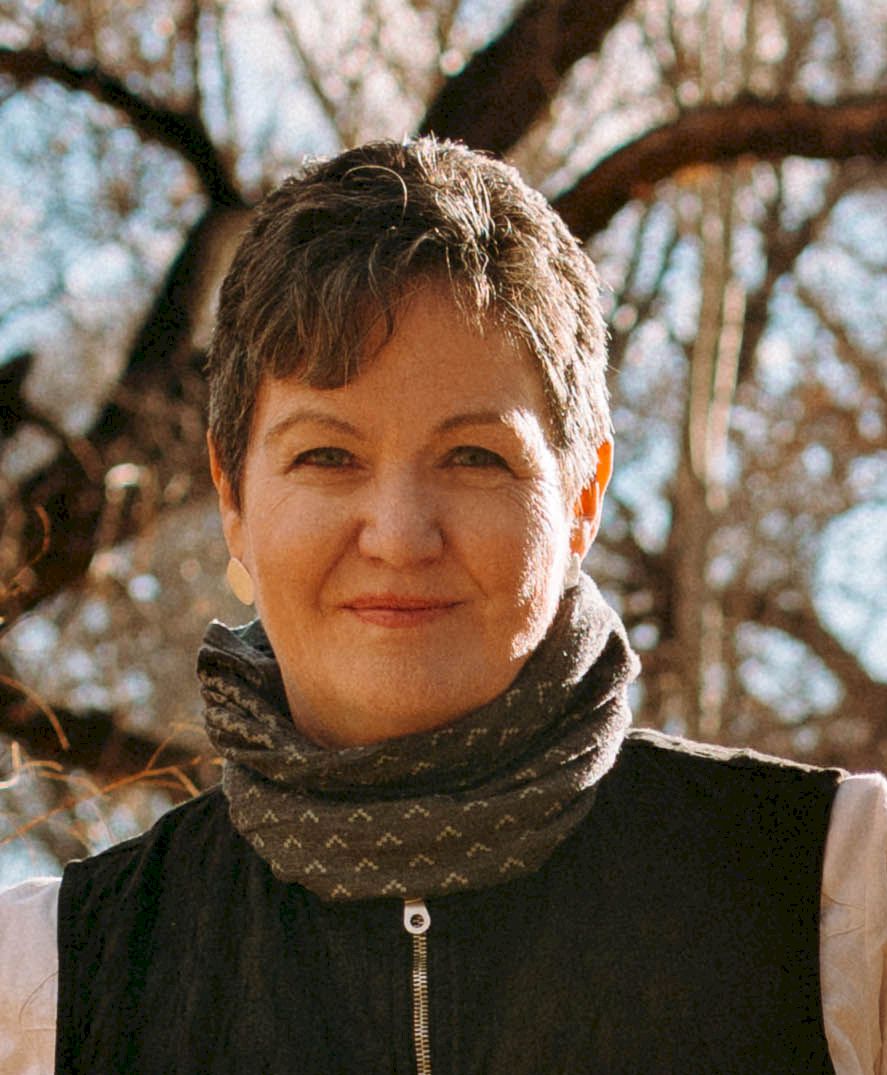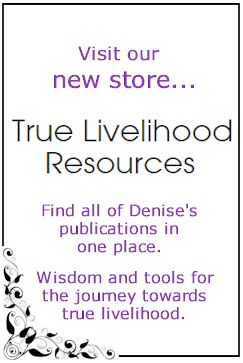More about Denise: Q&A
What do you say when people ask you “What do you do?”
Honestly, I hate that question because I have not found an easy way to describe the spirit and intent of my work. Truth be told, I usually give some pat answer like, “I am a trainer, a writer, and a keynote speaker on issues of employment and diversity”, and then quickly find a way to change the subject. My least favorite title is “motivational speaker”. I really dislike that one. If I had to put it in a nutshell, I think I would say something like this:
"I am a teacher and a writer who attempts to weave concepts, story, poetry and practical applications in a way that brings people to view others, the world, and themselves in a brighter, more expansive way. I aspire to give people new eyes and a new mind with regard to the work they do and how they do it. In this I am a Hope Dealer, and a Purveyor of Possibilities. I am also proud to be a bit of a Rabble-Rouser, believing in the adage that the best speakers are meant to ‘afflict the comfortable and comfort the afflicted, especially where the bitter effects of bureaucracy have taken root. Above all, I aspire to live up to the title of a Perpetual Proponent of the Human Spirit, invoking in my audience a reverence for themselves and for the people they come into contact with day to day."
Now you see why I try to change the subject when someone asks what I do.
What do you think is important for people to know about your background?
I don’t think most people in my audiences care very much where I was educated, what I majored in, or which degrees I earned. They don’t care about the particulars of my CV or my resume. What they want to know is how I came to learn what I teach. I am not an academic or a professionally trained speaker on the subjects of career counseling and job development - I more of a job developer and a career coach who loves the field so much that I can’t help but speak about it. That’s what I think most qualifies me to do what I do – the sheer passion and utter respect I feel for this profession and the important work we do.
Just out of college, I had the privilege of working with people in a variety of settings, from social service agencies to adult education programs, people who came with a wide range of barriers, but who also brought a vast spectrum of assets and strengths. They included refugees and immigrants, ex-offenders, youth, welfare recipients, and persons with disabilities. What I came to quickly learn is that each person came with their own story, their particular problems and their unique potential. 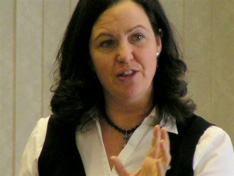 These individuals and the employers I worked with over those years were my greatest teachers. Like most, I learned to do job development by the seat of my pants – an education I would not trade for anything in the world. Sure, I have a Bachelor’s Degree in Linguistics and a Master’s Degree in Multicultural Education, but the instruction that most informs my message today was the day to day demands of the job and what I learned along the way.
These individuals and the employers I worked with over those years were my greatest teachers. Like most, I learned to do job development by the seat of my pants – an education I would not trade for anything in the world. Sure, I have a Bachelor’s Degree in Linguistics and a Master’s Degree in Multicultural Education, but the instruction that most informs my message today was the day to day demands of the job and what I learned along the way.
How did you make the switch from being a job developer to becoming a trainer, and what prepared you for becoming a professional speaker?
Using the strategies that I ended up detailing in Beyond Traditional Job Development, I caught the attention of the funding source I was working under in the State of California and I was asked to put together a one-hour workshop on what I was doing differently that led to the dramatically higher placement and retention rates of the people I was representing. I remember being totally freaked out at the prospect of speaking for an entire hour! Little did I know what an auspicious turn of events that would become and what doors it would eventually open.
From the start, I felt very at home in the role of a trainer, particularly with my peers who were as eager as I was to find new strategies for working with employers. I began speaking in front of any group that would listen to me, until I had developed enough of a reputation to be hired as a trainer for a 6 month contract with the State Office of Refugee Services for the State of California. During that time I met up with Milt Wright and Richard Pimentel; we started our own company, Milt Wright and Associates (MWA). I worked with MWA for 15 years before going off on my own and starting up Diversity World with my husband, Rob McInnes. The rest, as they say, is history.
Who would you say is your primary audience?
That is an aspect of my work that has changed over the years. At the onset, it was job developers, career developers, rehabilitation counselors, educators, case managers, and employment specialists – anyone working to prepare and place individuals with barriers to employment into the world of work. The nature of the barrier matters little, since the strategies and principles for overcoming them are fundamentally the same. So I speak to those working with individuals with disabilities, welfare to work programs, veterans, youth, older workers, dislocated workers, people coming out of corrections, recently arrived refugees and immigrants.
While this remains my primary audience, as my message as has grown and evolved over the years, so has my audience. With my newer seminars on subjects like Everyday Leadership, Employee Engagement, Creating an Inclusive Workplace, and Renewing Purpose and Passion in the Workplace, I am speaking to a much more eclectic audience, in the private and public sectors, to people on all levels and in a cross-section of departments and industries. I love delivering in-service trainings to the entire staff of agencies and organizations, usually in the style of an all-day retreat.
What kind of training do you deliver for employers?
Early in my training career I developed various curricula with a Train the Trainer model for use within corporations. These included a diversity training program for Oracle, Attitudes towards People with Disabilities training for EDS, and a Customer Service for People with Disabilities training module for the Hyatt Corporation. Various companies, including the Marriott Hotels, have also incorporated 30 Ways to Shine as an adjunct to their new employee orientation programs. For the State of Wisconsin my partner Rich Pimentel and I developed a train the trainer program for employers on Developing the New Employee in a Diverse Workforce, in which we trained over a hundred community college instructors who delivered the training to employers throughout the state. (Talk about fun!) Richard and I also wrote a handbook entitled What Managers and Supervisors Need to know about the ADA which we presented to numerous employers throughout the United States. I have presented at a few SHRM (Society for Human Resource Management) conferences and for various business associations.
While I love speaking to employers, what our customers have found through the years is that it is hard to get them in the room. What I prefer to do is give my audiences the skills and confidence to effectively reach out to employers whereby they can develop partnerships with them, one on one, or equip them to deliver training to supervisors and managers on-site. Nothing beats person to person relationships to break down barriers and explore new opportunities!
What training did you received to become a professional speaker?
I am often asked if I took Toastmasters, or if I majored in Speech or Drama in school, which I did not. The truth is that I have never received any kind of formal training as a speaker, and as a result, I couldn’t tell you what it is I am doing that works. What I do know is that I only talk about what I love. I believe that the energy and passion I have for my subject, whatever that might be, comes through without my having to think about “training techniques”. That has always been my advice to others who want to become professional speakers – find what you love so much that you can’t shut up about it, then find the audience who cares enough about that subject to pay to hear about it.
Who has influenced your work over the years?
That’s an important, but very tough question. If only we had a clear grasp of all the people over the years who help shape who we are and what we do! My own list would have to include my first mentor, Esther Stone, who was a community activist on behalf of refugees in San Jose, California in the 1980’s. She was the first person to show me what it meant to “be the change you wish to see in the world”. A contemporary of Margaret Mead, she also believed that all social change can and does happen beginning with one person.
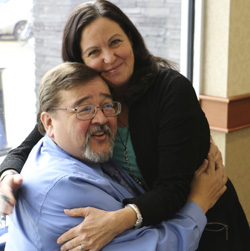 |
There are many, many others, but I would be remiss not to mention Richard Pimentel. Ever since attending his Windmills training in the mid-80’s, I have considered him one of my greatest mentors, and I feel so fortunate to have trained side by side with him for over a decade. Just recently we joined up again and created a two-day program entitled, “The Disability and Employment Forum”. Aside from his brilliance, Rich is a total kick in the pants to partner with on the training floor!
I have been and continue to be greatly influenced by many great writers and teachers from a variety of fields and spiritual traditions. Among those who have most influenced my thinking and writing I would have to include (not in any particular order): Matthew Fox, Joanna Macy, Dawna Markova, Julia Cameron, Maya Angelou, Peter Block, Peter Vaill, Andrew Harvey, Margaret Wheatley, Martha Beck, Jean Houston, Joseph Campbell, John O’Donohue, David Whyte, Parker Palmer, Mark Nepo, and Thich Nhat Hanh. I am also very grateful to have been introduced to the marvelous works of Jean Vanier, John McKnight, and John O’Brien. I will never get enough of Thoreau and Emerson, and a daily dose of Hafiz, Rumi, and/or Mary Oliver is the best medicine I know.
You speak and write on a wide variety of topics. What are the major strands of your work and how have they been woven through your education? As a writer and a trainer, what are your intellectual pursuits?
I think my degree in Linguistics is reflected in my fascination with the world of words, and my Master’s in Multicultural Education certainly served to whet my appetite for reading and learning from a rich and eclectic array of sources. As a lifelong learner, I think people would rather know what I am a student of than what I am educated in. A quick look at my personal library will show that I am an eager participant in a never-ending, self-designed curriculum, keeping me, and hopefully my teaching and writing, on a growing edge. I would say the major strands of my intellectual pursuits which are most reflected in my teaching and writing would be these six:
- True Livelihood and Work Engagement: I am forever engrossed in questions relating to people’s relationship to work, what makes us tick as human beings, and how we excavate and express our best qualities and gifts in the workplace.
- Transition and Change: I am enthralled with issues of human motivation – how we make choices and decisions, when we take risks and when we play small, how we navigate transition, and the circumstances which invoke the resilience of the human spirit.
- Diversity and Inclusion: I have an insatiable appetite for all topics arising from diversity, particularly relating to what keeps people marginalized in our communities, and how to transcend and transform our thinking so that we can create truly inclusive workplaces.
- Culture and Communications: I am eternally curious about the intricacies of human communication, and how we can restore a little humanity to the world of human services through the language we use, the questions we employ, and the ways that we engage with and listen to each other. I am captivated by the efficacy of storytelling and creating circles for courageous conversations.
- Innovation and Business Strategy: I love learning about business trends, best practices for employee engagement, innovative thinking, leadership principles, and entrepreneurial strategies that keep companies, big and small, thriving and growing.
- Vocation as a Spiritual Journey: I consider myself an avid apprentice in the spiritual aspects of the vocational journey, fascinated by and devoted to ideas on how we can bring a sense of reverence and wholeheartedness to what we do every day.
What I love most about my work as a trainer and a writer is the privilege and obligation to continue honing and growing my message, staying current, and having something new to say. That, of course, has been one of the huge gifts of writing the True Livelihood Newsletter.
You have developed a huge following with your True Livelihood Newsletter. What’s that about?
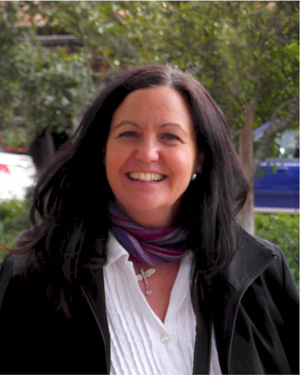 In 2003 I published a book entitled, “The Wholehearted Journey: Bringing Qualities of Soul to Everyday Life and Work.” The book was such a pleasure to write, that I just kept on writing, until one day my husband chided me saying, “You’re not supposed to be writing The Unending Journey”. He reminded me that just because I was finishing the book, it didn’t mean I had to stop writing. Thus, the True Livelihood Newsletter was born. Every article is like a chapter of a book, using very much the same pattern I used in the Wholehearted Journey, complete with a Poem of the Month, Thoughts to Consider, and ideas for Putting It Into Practice.
In 2003 I published a book entitled, “The Wholehearted Journey: Bringing Qualities of Soul to Everyday Life and Work.” The book was such a pleasure to write, that I just kept on writing, until one day my husband chided me saying, “You’re not supposed to be writing The Unending Journey”. He reminded me that just because I was finishing the book, it didn’t mean I had to stop writing. Thus, the True Livelihood Newsletter was born. Every article is like a chapter of a book, using very much the same pattern I used in the Wholehearted Journey, complete with a Poem of the Month, Thoughts to Consider, and ideas for Putting It Into Practice.
It has been a complete joy to me, always wondering, always reaching, for that next theme or topic to decipher, explore and expound upon. After ten years of writing, there is already enough content to warrant another five or six books, on subjects as varied as the topics mentioned above. We love making it available to people for free and we have received amazing feedback over the years of how those articles have been used and passed on in a variety of settings and contexts. I also have to say that the ongoing evolution of my keynotes and workshops is in large part due to the writing of these articles.
People have come to expect poetry at your presentations. How did that develop?
I think it’s important that each of us find a way to bring our voice to work, a mark of authenticity, our signature. For me, it’s storytelling and poetry. Everyone is hip to hearing a good story, which is why it is such a powerful teaching method. Poetry is a different animal. A lot of people squirm in their seats when I announce that I am going to recite a poem, such that the discomfort in the room is palpable. That’s because most people anticipate that it will be the sticky sweet Hallmark version of poetry or it will be too hard to understand. It has been really fun for me to introduce people to a version that is accessible and user-friendly, while not sacrificing the trademark work of poetry which is to pack substance and meaning into the frame of few words. What may take me 20 minutes to adequately express through a talk, I can convey in a two-minute poem. It’s not for everyone, but it doesn’t have to be. It’s enough that the audience see me walk my talk and take the risk of being vulnerable, which is often required of true authenticity.
When did you begin weaving photography into your training?
I think I was one of the longest holdouts on using PowerPoint, simply because I couldn’t stand the look of clip art. It wasn’t until I learned you could use real photographs that I got hooked. I mean “hook, line and sinker” hooked. It’s wonderful being able to augment my message with the beauty, color and vibrancy of the things that I love whether it be colored lanterns, musical instruments, the Redwood forest, or my newest obsession; murals on local buildings of the cities I visit. I also have several looped presentations of a hundred or more photos on various topics which I play during breaks or before or after my training sessions. For example, one is of bridges as a metaphor for job development, one is of doors and windows as a metaphor for thoughts, and the newest is of birds and nests as a metaphor for hope and change. Samples of some of these slides are scattered throughout this website… enjoy!
How do you pride yourself as a trainer?
I treat every presentation, regardless of how big or small, as if it is my first and if it is my last. After all, this is “the first” for those I am speaking to, and for all I know, it could be “the last”, as tomorrow is not promised to anyone. This perspective serves as a powerful reminder to bring my personal best, and in the best spirit possible. This requires authenticity, wholeheartedness, and clarity of purpose. I don’t think you can fake those qualities, and people in the room can feel them. I am often told that I come across as “genuine” and “real”. For me, that’s the highest compliment. No one wants to listen to someone who is not fully present in that moment, in that place, with that group of people. I can honestly say that I give 100%, so regardless of how I am received, at the end of the day, that is the criteria upon which I judge myself – “Did I give it my all?
About Denise: Overview and 15 Core Beliefs
Back to top

